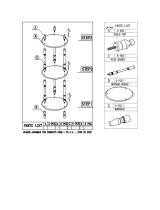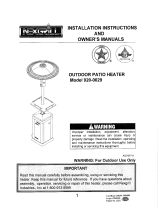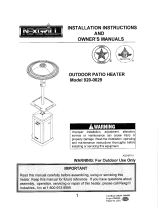Page is loading ...

1
USER'S MANUAL
READ BEFORE USE! Factory No.: HYPH50061-48 Style No.: 66694
Propane Patio Heater
IMPORTANT
Read this manual carefully
before assembling, using or
servicing this heater.
Keep this manual for future
reference.
COMPLIES WITH ANSI Z83.26a-2008/CSA 2.37a-2008 STANDARDS
FOR GAS-FIRED OUTDOOR INFRARED PATIO HEATERS

2
General Safety Information...................................... .2
Assembly Instructions
Components……………............................................ 4
Components List………............................................ 5
Installation Process
Step1 - Attach Post Assembly to Cylinder Housing...5
Step 2 –Attach Head Assembly to Post.....................6
Step 3 –Attach Reflector Stud to Head Assembly…. 6
Step 4 –Attach Center Reflector to Reflector Panel...7
Step 5 –Attach Reflector Assembly to
the top of Head Assembly…………………… 8
Connect Hose & Regulator to Cylinder……………… 8
Check for leaks......................................................... 9
Minimum clearances................................................ 10
Operation…………................................................... 10
Storage ………..........................................................12
Maintenance............................................................. 12
Service...................................................................... 14
Co
n
te
n
ts
Ge
n
e
r
a
l
Sa
f
ety
Inf
o
rm
at
i
o
n
Do not store or use gasoline or other flammable
vapor and liquids in the vicinity of this or any
other appliance.
An LP-cylinder not connected for use shall not be
stored in the vicinity of this or any other
a
pp
liance.
propane fueled equipment.

3

4
24

5
Part
No.
Description
Qty Part
No.
Description Qty
1 Wing Nut 3 2 Flat Washer 9
3 Cap Nut 9 4 Reflector Panel 3
5 Center Reflector 1 6 Reflector Assembly 1
7 Small Screw M6 9 8 Reflector Stud 3
9
Heater Burner Screen
1 10 Head Assembly 1
11 Post 1 12 Regulator 1
13 Body 1 14 Ф6 washer 3
15 Ф6 lock washer 3 16 M6 Nut 4
17 Screw M4 X 12 2 18 Door fixer 1
19 M6 Nut 1 20 Screw M6 X 30 1
21 Door 1 22 M8 X 30 Wing screw 1
23 Feet 4 24 Small flat washer 9
Components List
Installation process
Note: You must follow all steps to properly assemble heater.
Do NOT attempt to assemble without proper tools.
Step 1 – Attach Post Assembly
to Cylinder Housing
■
Insert the post through the
bottom of the body. Attach the post
to the body using Ф6 washer
(3pcs), Ф6 lock washer (3pcs) and
M6 nut (3pcs). Please see Figure
1.
Figure 1

6
Step 2 –Attach Head Assembly
to Post
■ Unscrew pre-assembled bolts
(4pcs) form head assembly.
Please see Figure 2.
■ Load head assembly by
inserting gas hose into post.
Please see Figure 3.
■ Insert head assembly into
post. Attach using bolts (4pcs).
Tighten securely. Please see
Figure 4.
Step 3 –Attach Reflector Studs
to Head Assembly
■ Attach reflector studs (3pcs)
and flat washers (3pcs) to the
top of head assembly and
tighten the securely. Please
see Figure 5.
.
Figure 2
Figure 3
Figure 4 Figure 5

7
Step 4 –Attach Center Reflector
to Reflector Panel. Figure 9
■ Remove protective cover
before assembling. Please see
Figure 6
■ Slide two reflector panels
together. Please see Figure 8
■ Insert small screw M6*10
(1pc), Ф6 washer (1pc) and
screw on M6 nut (1pc) loosely
to attach 2 panels together.
Please see Figure 8.
■ Slide third reflector panel onto
assembled reflector panels.
Figure 8
■ Insert small screw M6*10
(2pcs), Ф6 washer (2pcs) and
screw on M6 nut (2pcs) loosely
to attach. Please see Figure 8
■ Place center reflector over
assembled reflector panels
and insert small screw M6*10
(6pcs) , Ф6 washer and screw
on M6 nut (6pcs) loosely to
attach. Fully tighten all of the
screws. Figure 7 and 8.
Figure 6 WARNING!
Remove protective cover before assemble.
Figure 8
Figure 7

8
Connect Hose & Regulator to Cylinder
Step 1 – Gas Cylinder Required
■ You must provide propane gas and propane cylinder. Use a standard 20lb.
propane cylinder only.
■ Use this heater only with a propane vapor withdrawal supply system. See
Chapter 5 of the Standard for Storage and Handling of Liquefied Petroleum
Gas, ANSI/NFPA 58.Your local library or fire department will have this book.
■ Maximum supply pressure of 250 psi. A minimum supply pressure of 11.0
W.C. is required for the purpose of input adjustment for propane gas.
■ The pressure regulator and hose assembly supplied with the appliance must be used.
■ The installation must conform with local codes, or in the absence of local codes, with
National Fuel Gas Code, ANSI Z223.1/ NFPA 54, Natural & Propane installation code,
CSA B149.1 as applicable.
■ A dented, rusted or damaged propane cylinder may be hazardous and should be
checked by your cylinder supplier. Never use a propane cylinder with a damaged valve
connection.
■ The propane cylinder must be constructed and marked in accordance with the
specifications for LP gas cylinders of the U.S. Department of transportation (DOT) or
the Standard for Cylinders Spheres &Tubes for transportation of Dangerous Goods &
Commission, CAN/CSA-B339, as applicable.
■ Never connect an unregulated propane cylinder to the heater.
■ Provided with a listed overfilling prevention device.
■ Provided with a cylinder connection device compatible with the connection for the
appliance.
■ Do not store a share LP-Gas cylinder under or near this appliance.
■ Place the dust cap on the cylinder valve outlet when ever the cylinder is not in use.
Only install the type of dust cap on the cylinder valve is provided with the cylinder
valve.
Figure 10
20LB Propane Cylinder
Step 5 –Attach Reflector
Assembly to the top of Head
Assembly
■ Attach reflector assembly to the
top of head assembly by sliding
reflector assembly over reflector
studs (3pcs). Fasten with flat
washers (6pcs) and wing nuts
(3pcs). Please see Figure 9.
Figure 9

9
Step 2
–
Install Cylinder on the
base.
■ Put the gas cylinder in the metal stand. Make
sure the gas tank sits on the metal stand
completely. Turn the wing screw on the outer
part of metal stand clockwise to secure the
gas tank tightly. Please see Figure 11
Step 3 –Connect the Regulator to
the gas cylinder valve.
CAUTION: Always confirm that the burner control
knob is in the “OFF” position before connecting the
gas supply.
Insert the nipple of the regulator into the
cylinder valve and tighten the black coupling
nut by turning it clockwise. Hand tighten
only.
Once the regulator is connected to the
cylinder valve, be sure that all connections
are tightened before lighting the patio heater.
See Fi
g
ure 12
Check for leaks
Warning:
Perform Leak test outdoors only.
Never leak test when smoking.
Do not use a flame to check for leaks.
Your Patio Heater has been checked at all factory
connections for leaks. To check the connection of
the regulator/cylinder: See Figure 15
■ Make leak solution by mixing 1 part liquid dish
soap and 3 parts water.
■ Brush several drops (or use spray bottle) of
the solution onto the gas hose/regulator and
regulator/cylinder connection.
■ Turn on gas. Inspect the connections and look
for bubbles.
■ If no bubbles appear, the connection is safe.
■ If bubbles appear, there is a leak, loosen and
re-tighten this connection.
NOTE:
Whenever gas connections are loosened or
removed, you must perform a complete leak test.
Figure 15
Figure 11
Figure 12

10
Minimum clearances
BE CAREFUL: WHEN CERTAIN
MATERIALS OR ITEMS ARE Stored,
ABOVE, BESIDE OR UNDER THIS HEATER
WHILE IN USE, THEY WILL BE SUBJECT
TO RADIANT HEAT AND COULD BE
SERIOUSLY DAMAGED.
■ This heater is primarily used for the heating
of outdoor patios, decks, and pool and spa
areas. Always make sure that adequate
fresh air ventilation is provided. Follow the
spacing tolerances shown in Figure 16.
■ The minimum clearances, shown in Figure
1, must be maintained at all times.
■ This heater must be placed on firm level
ground.
■ Never operate in an explosive atmosphere.
Keep away from areas where gasoline or
other flammable liquids or vapors are
stored or used.
Figure 16
Operation
WARNING: DO NOT attempt to operate heater until you have read and understand all
precautions. Failure to do so can result in serious personal injury, death or property
damage.
Before Turning Gas Supply ON
Your heater was designed and approved for OUTDOOR USE ONLY. DO NOT use it inside a building, or any
other enclosed area. Make sure surrounding areas are free of combustible materials, gasoline and other
flammable vapors or liquids. Ensure that there is no obstruction to air ventilation. Be sure all gas connections are
tight and there are no leaks. Be sure the access panel is clear of debris. Be sure any component removed during
assembly or servicing is replaced and fastened prior to starting.
Before Lighting
Heater should be thoroughly inspected before each use and by a qualified service person at least annually. If
relighting, always wait at least 5 minutes.

11
Note: This heater is equipped with a Pilot Light
that allows for safer startups and shutdowns.
Pilot must be lit before Main Burner can be
started.
■ Open valve at gas cylinder.
■ Open Viewing Hole by sliding cover to either side.
(See Figure 18)
■ Push Control Knob IN and rotate to Pilot position.
(See Figure 17-1
)
Note: For initial start or after any cylinder change,
hold Control Knob IN for 2 minutes to purge air
from gas lines before proceeding.
■ While depressing control knob, press spark igniter
button to light up Pilot. And be visible through
Viewing Hole.
■ Release Control Knob after 30-60 seconds. Pilot
Light will remain lit. If not, return to step 1.
■ Turn Control Knob to LO or HI position. (See
Figure 17-2
) Main Burner will light immediately.
Flame is visible through Viewing Hole. If not, return
to step 1.
WARNING: If spark igniter fails to light the
pilot after 30 seconds, release control knob,
turn to “OFF” position (See Figure 20) , all
valves should be closed and wait 5 minutes
before relight.
■ If for some reason your spark igniter fails to
deliver a spark, your heater can be started by
inserting a lit match through the viewing hole (See
Figure 19) while pushing the control knob in while in
the “PILOT” position(See Figure 17-1).
Figure 17-1 Figure 17-2
Figure 18 Viewing Hole
Figure 19 Match lighter
When heater is ON:
■ When lit for the first time the heater may emit a slight odor and smoke. This is a normal temporary condition
caused by the “burn in” of paints and lubricants used in the manufacturing process and will not occur again.
Simply run the heater on “high” for 30 minutes.
■ Emitter screen will become bright red due to intense heat. The color is more visible at night. Burner will
display tongues of blue flame. These flames should not be yellow or produce thick black smoke, indicating an
obstruction of airflow through the burners.
Never leave the heater unattended while in use.
Observe the
flame pattern
Lighting

12
Note: Wait until heater is cool before covering.
When heater is not in use for a prolonged period of time, remove gas cylinder.
Verify that the gas cylinder valve is closed tightly.
Do not store the gas cylinder indoors, store gas cylinder in a well ventilated area.
Storage
To obtain the best performance from your heater make sure you perform the following
maintenance activities on a regular basis:
■ Keep exterior surfaces clean. Use warm soapy water for cleaning. Never use flammable
or corrosive cleaning agents. Be sure to keep the area around the burner and control
assembly dry at all times.
■ Keeping the ventilation openings of the cylinder enclosure free and clear from debris.
Visually checking burner flames with pictorial representations
shown on page 11.
■ Airflow must be unobstructed. Clear insect nests or webs away from your heater’s
exterior and interior using a straight piece of wire and wire brush or vacuum cleaner at
least once a year or immediately upon indication of any of the following systems:
a. Flashback
b. Smell the fuel gas
c. Predominate yellow flames
d. Excessive popping noises during operation
e. Uneven emitter glow
Carbon deposits may create a fire hazard. Clean dome and emitter with warm soapy Water if
necessary.
Caution:
Never use wood or plastic, it may break and block the parts.
Never spray any cleaning product on the emitter grid or burner area.
Maintenance
■ Turn Control Knob clockwise to Pilot.
(Normally, burner will make a slight popping
sound when extinguished.) Burner will
extinguish but Pilot will remain ON.
■ To extinguish Pilot, depress Control Knob
and continue to turn it clockwise to OFF.
(See Figure 20).
■ Turn off gas supply at the valve of gas
cylinder.
■ Disconnect the cylinder and remove when
the heater is not in use.
Figure 20
Shut down

13
PROBLEM PROBABLE CAUSE SOLUTION
Pilot will not light
Gas valve may be OFF Turn the gas valve ON
Gas Cylinder empty Refill LP gas cylinder
Orifice blocked Clean or replace orifice
Air in supply system
Purge air from lines, with knob in
pilot position, depress and hold
in, to release air.
Loose connection Check all fittings
Igniter is not sparking
Use match to light pilot; obtain
new igniter and replace
Pilot will not stay on
Debris around pilot Clean dirty area
Thermocouple bad Replace thermocouple
Gas leak in line Check connections
Burner won’t light
Pressure is low Refill or replace LP gas cylinder
Orifice blocked Remove, clean and replace
Thermocouple is bad Replace thermocouple
Pilot light assembly bent
or not in correct location
Place pilot in proper position and
retry
Burner flame is low
Gas pressure is low
Turn cylinder valve OFF and
replace cylinder
Outdoor temperature is less
than 40ºF and tank is less than
1/4 full
Use a full cylinder
Supply hose is bent or kinked Straighten hose
Carbon build up
Dirt or film on reflector and
burner screen
Clean reflector and burner screen
Thick black smoke Blockage in burner
Remove blockage and clean
burner inside and outside
Troubleshooting and replacement parts
To learn how to service and procure parts for worn out, defective or damaged components
which shown in below list need replace please contact your selling dealer or call us directly
for assistance. Please provide us with heater’s model number and the serial number.
Warning: Use our original equipment replaced parts only. Use unauthorized parts or
modification of parts can void warranty and create an unsafe condition.

14
■ A hazardous condition may result if a heater is used that has been modified or is not
functioning properly. When the heater is working properly:
• The flame is contained within the heater.
• The flame is essentially blue.
• There is no strong disagreeable odor, eye burning or other physical discomfort.
• There is no smoke or soot internal or external to the heater.
• There is no unplanned or unexplained shutdown of the heater.
• There is no Flashback.
• There are no excessive popping noises during operation.
• There is no diminished and uneven emitter glow.
The parts list shows the heater as it was constructed. Do not use a heater, which is different
from that shown. In this regard, only the cylinder connections and regulator supplied with the
heater. Do not use alternative parts. For this heater the regulator is set for 11.0” water
column outlet pressure. If there is any uncertainty about the regulator setting, have it
checked. A heater that is not working properly must be repaired, but only by a trained,
experienced service person.
■ If your heater needs maintenance or is not working properly, please contact your local
authorized agent for service. It is a necessity to contact an authorized source for
replacement of parts and/or other servicing.
IF YOU HAVE QUESTIONS OR CONCERNS
PLEASE CALL BOND TOLL FREE #
1-866-771-BOND (2663) OR TO BETTER
EXPEDITE YOUR REQUEST FEEL FREE TO EMAIL US
OR LOG IN TO OUR WEBSITE UNDER CUSTOMER SERVICE SUPPORT
www.bondmfg.com
BOND MANUFACTURING CO.
1700 West 4th Street Antioch, CA 94509 USA
Service
/







